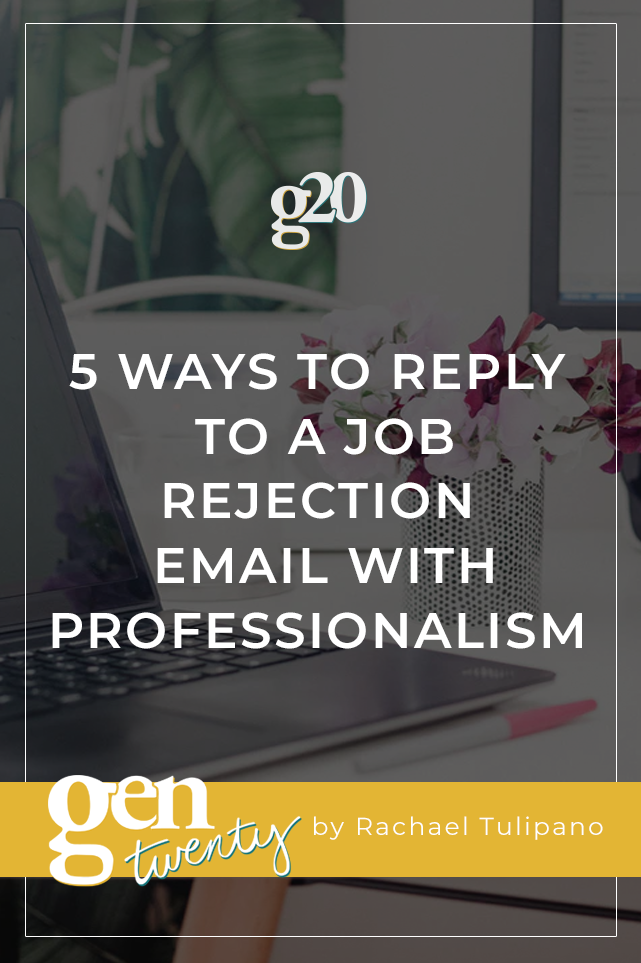
The hardest part of job hunting is getting rejected. You spend all that time researching a company, thoroughly writing your cover letter, submitting your application, landing an invitation to interview, nailing the interview, and yet, you still got rejected. It hurts, right? It’s discouraging, frustrating, unfair, and even though it’s business, it does feel personal.
Rejections sting and if you receive enough of them, you start to feel defeated. You don’t want to stay silent, you’ll want to reply to a job rejection email with professionalism, and you’ll know that even if you didn’t get the job you wanted, you handled every step with the utmost professionalism.
But you know what? You need to change your frame of mind. Instead of looking at rejections as failure, view them as opportunities. You didn’t get this job, or maybe a handful of jobs, but maybe they just weren’t the right ones for you. The saying “when one door closes, another opens” exists for a good reason. Rejections are the universe’s way of saying “This isn’t right for you. What is right for you is still coming.”
While you’re still holding out hope for the right opportunity, take the time to reply to the wrong ones that rejected you. It’s good form to reply with professionalism.
Here are 5 ways to reply to a job rejection with professionalism:
1. Thank the hiring manager for their time.
Too often recruiters or hiring managers don’t even let applicants know if they got the job or not. It’s frustrating and disrespectful of a candidate’s time and energy to be left hanging.
So if you did get a reply, even if it’s not the outcome you hoped for, take the time to thank the person on the other end of the phone or email. Let them know you appreciate their time and consideration. Be polite and gracious. You don’t want to end the communication on bad terms, so keep it light, professional, and positive.
2. See if the company can keep your resume on file.
If this was a job you really wanted or a company you desperately want to work for someday, ask the hiring manager if they can keep your resume on file. Asking them to do so could help them consider you for future openings and opportunities. It could simply be that you weren’t the best fit for the job at hand, but another opening down the road could be better suited for you. It doesn’t hurt to ask. And if they say no? No biggie. Thank them anyways and move on.
3. Ask what was missing from your application.
In some instances, your background, experience, skills, and education might be an exact match for a job description. It might even feel like a certain job was made for you. To get rejected from something like that is inexplicably discouraging. Always make sure to reply to a job rejection email. Take this opportunity to ask for more information.
There are nice ways to essentially say “I understand I was not chosen for this opportunity, but could you please tell me what was missing from my application?” It might probe the hiring manager or recruiter to provide you with feedback, as opposed to a generic rejection.
Maybe you didn’t interview as well as you thought you did. Perhaps you had all the skills, but lacked the type of personality the team was looking for. Maybe you had it all, but another candidate had more to offer. None of these instances mean you failed. It just wasn’t right for you.
4. See if the hiring manager can offer constructive criticism.
Look at interviews as opportunities to learn. You might have the brains and the practical skills, but simply didn’t interview well. And in this case, the hiring manager might be able to offer some pointers. Some people are more than happy to give advice, like encouraging you to make eye contact, ask questions, come prepared with concrete examples of past projects, or even have a better understanding of the company before meeting with the team.
Don’t get down on yourself if the hiring manager does point out some mistakes you made. Use this as an opportunity to be better next time and prepare yourself.
5. Connect on LinkedIn.
LinkedIn is like the Facebook of the professional world. It’s a fantastic platform to network, connect with like-minded professionals, participate in engaging conversations, read up on news in your field, message other professionals, and track your work history.
If you don’t have a LinkedIn profile, you should probably consider making one. If you do, try connecting with the hiring manager or recruiter on LinkedIn. Even though you didn’t get the job, you still established a new connection. Networking is key and it’s what helps a lot of people get job leads. The more connections you have on LinkedIn, the better. And you never know if connecting with someone who rejected you could lead to them inviting you to apply for positions at their company in the future. If they see you on LinkedIn, they’ll likely remember you and think of you for the job. It certainly doesn’t hurt!
Rejection hurts, no matter if it’s personal or professional. The next time you don’t get the job, refer back to these tips to handle that rejection with finesse. You don’t have to silently take it. Replying back to a rejection is perfectly reasonable. Do your best to be understanding of their decision and thank them for their time. Respect goes a long way. Good luck!
